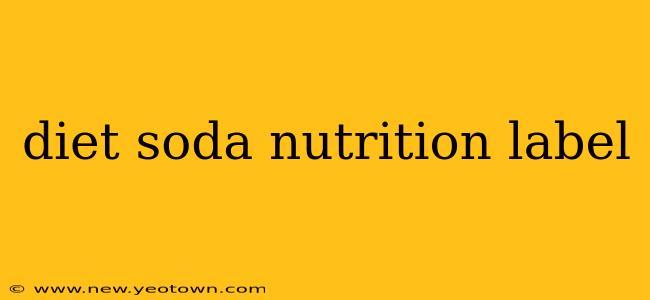We've all been there. Reaching for that refreshing, ice-cold can of diet soda, believing we're making a healthy choice. But what's actually lurking behind that "zero calorie" claim? Let's dive deep into the diet soda nutrition label and unravel the truth. This isn't just about numbers on a label; it's about understanding the ingredients and their potential impact on your health.
My journey into the world of diet soda began with a simple question: Why do these drinks taste so sweet, yet boast zero calories? The answer, as I discovered, lies in the fascinating world of artificial sweeteners.
What are the main ingredients in diet soda?
The cornerstone of most diet sodas is the artificial sweetener. Common culprits include aspartame, sucralose, saccharin, and acesulfame potassium. These are significantly sweeter than sugar, allowing manufacturers to deliver that familiar sugary taste without adding calories. However, the long-term effects of these sweeteners are still a subject of ongoing research and debate. The label will clearly list the specific artificial sweetener used. Beyond the sweetener, you'll find carbonated water, natural and artificial flavors, and often preservatives to maintain shelf life. These ingredients vary slightly depending on the brand and flavor.
What are the potential health effects of artificial sweeteners?
This is a question that frequently pops up in discussions surrounding diet soda. Studies on the long-term health impacts of artificial sweeteners have yielded mixed results. Some research suggests potential links to metabolic issues, while others find no significant adverse effects. It's crucial to remember that correlation doesn't equal causation, and further research is needed to establish definitive conclusions. The best approach is to consume diet soda in moderation, if at all, and prioritize a balanced diet rich in whole foods.
Does diet soda help with weight loss?
Many believe that switching from regular soda to diet soda is a guaranteed path to weight loss. While eliminating the significant caloric contribution of sugar is certainly beneficial, diet soda's role in weight management is nuanced. Some studies suggest that the artificial sweeteners might disrupt the body's natural regulation of appetite and blood sugar, potentially leading to increased cravings and hindering weight loss efforts. Furthermore, the perceived "health halo" of diet soda can lead to overconsumption of other less healthy foods and drinks.
Is diet soda better than regular soda?
This is the million-dollar question. From a purely caloric perspective, diet soda certainly wins. The absence of sugar significantly reduces the overall calorie intake. However, the potential long-term health effects of artificial sweeteners remain a point of contention. Ultimately, the "better" choice depends on individual health goals, dietary preferences, and tolerance to artificial sweeteners. For some, the minimal calorie intake might outweigh potential concerns, while others might opt for sugar-free alternatives like sparkling water infused with natural flavors.
Are there any natural alternatives to diet soda?
Absolutely! Consider sparkling water, infused with natural flavors like fruit slices or herbs. You can also explore herbal teas, which provide hydration and often contain antioxidants. These alternatives offer refreshing choices without the added artificial sweeteners or preservatives commonly found in diet soda. Remember, moderation is key, even with healthier options.
The Bottom Line: Informed Choices are Key
The diet soda nutrition label provides a snapshot of the ingredients, but it doesn't tell the whole story. Making informed choices about your beverage consumption requires understanding the potential implications of artificial sweeteners and prioritizing a balanced diet and lifestyle. This exploration of the diet soda label should empower you to make decisions that best serve your individual health needs and goals. Remember to consult with a healthcare professional or registered dietitian if you have any specific concerns.

